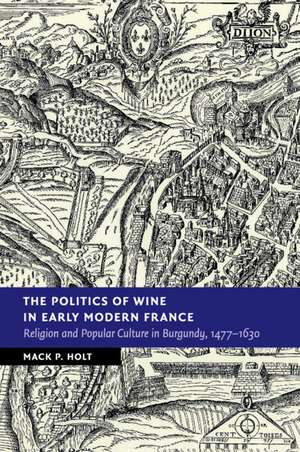The Politics of Wine in Early Modern France: Religion and Popular Culture in Burgundy, 1477–1630: New Studies in European History
Autor Mack P. Holten Limba Engleză Paperback – 4 mar 2020
| Toate formatele și edițiile | Preț | Express |
|---|---|---|
| Paperback (1) | 320.93 lei 6-8 săpt. | |
| Cambridge University Press – 4 mar 2020 | 320.93 lei 6-8 săpt. | |
| Hardback (1) | 758.86 lei 6-8 săpt. | |
| Cambridge University Press – 12 sep 2018 | 758.86 lei 6-8 săpt. |
Din seria New Studies in European History
-
 Preț: 177.91 lei
Preț: 177.91 lei -
 Preț: 238.02 lei
Preț: 238.02 lei -
 Preț: 208.49 lei
Preț: 208.49 lei -
 Preț: 398.41 lei
Preț: 398.41 lei -
 Preț: 237.92 lei
Preț: 237.92 lei - 9%
 Preț: 593.70 lei
Preț: 593.70 lei -
 Preț: 180.06 lei
Preț: 180.06 lei - 9%
 Preț: 592.60 lei
Preț: 592.60 lei -
 Preț: 169.70 lei
Preț: 169.70 lei -
 Preț: 211.13 lei
Preț: 211.13 lei -
 Preț: 166.99 lei
Preț: 166.99 lei -
 Preț: 266.53 lei
Preț: 266.53 lei -
 Preț: 241.90 lei
Preț: 241.90 lei -
 Preț: 429.99 lei
Preț: 429.99 lei -
 Preț: 400.05 lei
Preț: 400.05 lei - 11%
 Preț: 698.50 lei
Preț: 698.50 lei -
 Preț: 275.85 lei
Preț: 275.85 lei -
 Preț: 330.09 lei
Preț: 330.09 lei - 11%
 Preț: 695.93 lei
Preț: 695.93 lei -
 Preț: 423.10 lei
Preț: 423.10 lei -
 Preț: 340.13 lei
Preț: 340.13 lei - 11%
 Preț: 698.30 lei
Preț: 698.30 lei -
 Preț: 326.82 lei
Preț: 326.82 lei -
 Preț: 339.37 lei
Preț: 339.37 lei -
 Preț: 396.59 lei
Preț: 396.59 lei -
 Preț: 383.48 lei
Preț: 383.48 lei -
 Preț: 292.40 lei
Preț: 292.40 lei - 14%
 Preț: 682.94 lei
Preț: 682.94 lei -
 Preț: 282.75 lei
Preț: 282.75 lei -
 Preț: 417.07 lei
Preț: 417.07 lei -
 Preț: 437.18 lei
Preț: 437.18 lei - 14%
 Preț: 873.67 lei
Preț: 873.67 lei -
 Preț: 420.40 lei
Preț: 420.40 lei -
 Preț: 319.99 lei
Preț: 319.99 lei - 14%
 Preț: 687.39 lei
Preț: 687.39 lei -
 Preț: 397.01 lei
Preț: 397.01 lei - 11%
 Preț: 695.93 lei
Preț: 695.93 lei - 11%
 Preț: 543.84 lei
Preț: 543.84 lei
Preț: 320.93 lei
Nou
Puncte Express: 481
Preț estimativ în valută:
61.41€ • 64.29$ • 50.81£
61.41€ • 64.29$ • 50.81£
Carte tipărită la comandă
Livrare economică 05-19 aprilie
Preluare comenzi: 021 569.72.76
Specificații
ISBN-13: 9781108456814
ISBN-10: 1108456812
Pagini: 368
Ilustrații: 26 b/w illus. 3 maps 17 tables
Dimensiuni: 152 x 229 x 20 mm
Greutate: 0.49 kg
Editura: Cambridge University Press
Colecția Cambridge University Press
Seria New Studies in European History
Locul publicării:Cambridge, United Kingdom
ISBN-10: 1108456812
Pagini: 368
Ilustrații: 26 b/w illus. 3 maps 17 tables
Dimensiuni: 152 x 229 x 20 mm
Greutate: 0.49 kg
Editura: Cambridge University Press
Colecția Cambridge University Press
Seria New Studies in European History
Locul publicării:Cambridge, United Kingdom
Cuprins
List of figures; Acknowledgments; Abbreviations and translations; Units of currency and measurement in Dijon; Introduction; Part I. Burgundy after the Valois Dukes (1477 to ca.1560); 1. Guarding the gospels: elections and politics; 2. Protected by the Virgin Mary: lay religious experiences; 3. Beasts in the vines: wine and material life; Part II. The Wars of Religion in Burgundy (ca.1550 to 1595); 4. The reformation in Burgundy; 5. Origins of the Catholic League in Burgundy; 6. Collapse of the League in Burgundy; Part III. From Foy de Bourgogne to Absolute Monarchy (1595 to 1630); 7. The contraction of popular politics and Catholic reform; 8. The crown, the magistrates, and the people: the Lanturelu Riot of 1630; Conclusion; Bibliography; Index.
Recenzii
'This beautiful book makes Dijon an observation post for the profound transformations that affected the entire kingdom in the sixteenth and seventeenth centuries. And we are in debt to its author for having the knowledge to guide the reader with the clarity and pedagogy of a master.' Jérôme Loiseau, Translated from Annales de Bourgogne
'This is a compelling and detailed study which surveys a significant period in French history from the perspective of the province of Burgundy and its vignerons …' Noelle Plack, European History Quarterly
'Mack Holt, in this tightly written and long-matured work, bases his conclusions on a profound knowledge of the Archives municipales of Dijon, one of the best preserved in France, as well as on a wide range of visual, literary, and narrative sources. In doing so, he deploys a deep knowledge of the city and its culture, interweaving an analysis of public institutions with a study of social structures and of material culture to construct a portrait of a whole society through serious upheavals and challenges.' David Potter, Renaissance Quarterly
'Holt provides a fine and detailed narrative of the political life of a significant and somewhat unusual city through an eventful century and a half …' Jotham Parsons, The Journal of Modern History
'This is a compelling and detailed study which surveys a significant period in French history from the perspective of the province of Burgundy and its vignerons …' Noelle Plack, European History Quarterly
'Mack Holt, in this tightly written and long-matured work, bases his conclusions on a profound knowledge of the Archives municipales of Dijon, one of the best preserved in France, as well as on a wide range of visual, literary, and narrative sources. In doing so, he deploys a deep knowledge of the city and its culture, interweaving an analysis of public institutions with a study of social structures and of material culture to construct a portrait of a whole society through serious upheavals and challenges.' David Potter, Renaissance Quarterly
'Holt provides a fine and detailed narrative of the political life of a significant and somewhat unusual city through an eventful century and a half …' Jotham Parsons, The Journal of Modern History
Notă biografică
Descriere
Explores how workers in the local wine industry helped shape local politics and turn back Protestantism in early modern Burgundy.
